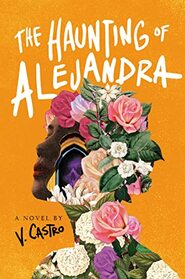V. Castro has combined magic, horror, psychology, and the social issues women have dealt with throughout history to illustrate a compelling struggle for sanity and survival in "The Haunting of Alejandra."
Alejandra is on the verge of losing it. The voice in her head speaks incessantly, feeding the message that she is worthless, that she is a poison to her children, that she is uselessly dragging the agony of her life out. She suspects this voice may be linked to La Llorona, the mythical ghost of Mexican folklore who drowned her own children. Pulsing just as strong is her suspicion she harbors a mental illness destined to suck her down the abyss.
"Death was easier than living. Difficult woman. Sick woman. Dead woman."
Her marriage is a trap. Her husband, Matthew, is charging full speed ahead with his own career and is blind to her despair. In his mind they had mapped out what life was to be like and she needs to stay content, to keep to her side of their agreement. Alejandra even references lines from the Kate Bush song "Running Up That Hill."
"And if I only could
I'd make a deal with God
And I'd get him to swap our places..."
There is a dream, a vision she keeps revisiting. In it a hidden body of water holds helplessly desperate women floating on their backs, unable to voice their message. Surrounding the water are rows of even more women generating a powerful energy Alejandra senses but cannot tap into.
Alejandra agrees with Matthew that she will seek mental helpâ but she adds a twist. She finds Melanie Ortiz, a therapist who is also a curandera, or native spiritual healer. The journey from here involves walking the line dividing psychology and magic. Is there a mental toughness which can defeat pure evil-- a demon who has fed on the suffering of generations of women in this family?
This is a gripping story. It is initially painful to witness Alejandra's mental state, but this is the setup to see if she can pull herself together to battle the assault on her and her family.
I received an advance review copy for free, and I am leaving this review voluntarily.
Alejandra is on the verge of losing it. The voice in her head speaks incessantly, feeding the message that she is worthless, that she is a poison to her children, that she is uselessly dragging the agony of her life out. She suspects this voice may be linked to La Llorona, the mythical ghost of Mexican folklore who drowned her own children. Pulsing just as strong is her suspicion she harbors a mental illness destined to suck her down the abyss.
"Death was easier than living. Difficult woman. Sick woman. Dead woman."
Her marriage is a trap. Her husband, Matthew, is charging full speed ahead with his own career and is blind to her despair. In his mind they had mapped out what life was to be like and she needs to stay content, to keep to her side of their agreement. Alejandra even references lines from the Kate Bush song "Running Up That Hill."
"And if I only could
I'd make a deal with God
And I'd get him to swap our places..."
There is a dream, a vision she keeps revisiting. In it a hidden body of water holds helplessly desperate women floating on their backs, unable to voice their message. Surrounding the water are rows of even more women generating a powerful energy Alejandra senses but cannot tap into.
Alejandra agrees with Matthew that she will seek mental helpâ but she adds a twist. She finds Melanie Ortiz, a therapist who is also a curandera, or native spiritual healer. The journey from here involves walking the line dividing psychology and magic. Is there a mental toughness which can defeat pure evil-- a demon who has fed on the suffering of generations of women in this family?
This is a gripping story. It is initially painful to witness Alejandra's mental state, but this is the setup to see if she can pull herself together to battle the assault on her and her family.
I received an advance review copy for free, and I am leaving this review voluntarily.




